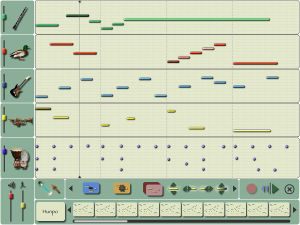TamTam
A music and sound exploration application for the OLPC
TamTam is a suite of four music and sound related activities for the XO. TamTam is written in python with some C functions for speed-critical services. The audio engine for TamTam is Csound.
- miniTamTam
- is an introductory music activity aimed at youger children. One chooses amongst dozens of different sounds that can be played polyphonically on the XO keyboard. There is a small "beatbox" to generate rythms and a simple sequencer to record short snippets of keyboard playing.
- synthLab
- is an advanced application for older children who are ready to venture into sophisticated sound design. synthLab is a physics lab and sound synthesiser modelled on Max/MSP.
- TamTam Edit
- The next stable XO build (#301) will see the first beta release of the TamTam music editor. TamTam Edit is a page driven event sequencer featuring a powerful music generator, a colorful and intuitive graphical interface to create, modify and organise notes on five virtual “tracks”, a palette of close to a hundred sounds and a music construction model that allows virtually limitless variations in all musical styles.
- (undefined name - subject to change) TamTam Jam (?)
- TamTam Edit joins miniTamTam and TamTam synthLab as the third component of a complete music and sound creation and collaboration environment on the XO. The fourth component consisting of a collaborative playing and composing tool will be forthcoming as soon as the mesh network technology stabilises.
TamTam Edit uses about 55-65% of the CPU when running full tilt and presently occupies about 20MB of ram.
Goals
- Provide children with a culturally-informed environment for making music and sound on the OLPC;
- Provide an audio/music experience that is instantly rewarding for a musically naïve user;
- Provide a pathway to more sophisticated musical experiences;
- Provide a playable musical instrument with its own “sound”;
- Provide a dynamically adaptable learning environment that proposes simplicity and welcomes complexity;
- Use mesh networking to encourage collaborative music making;
- Introduce notions of audio and music programming.
TamTam uses CSound as its audio engine
People
- Jean Piché
- Douglas Eck
- Olivier Bélanger
- Sean Wood
- James Bergstra
- Nathanaël Lécaudé
- Adrian Martin
- Eric Lamothe
TamTam is an educational application
Music is often described as the purest form of mathematical representation, driven instinctively by the human mind. It connects between people in many ways, and offers ways for expressing non-verbal emotion. In that sense music is related to problem-solving and communication.
On a more practical level, TamTam helps explore and explain ideas connected with sequences, fractions, repetition, transposition, and representation, all of which are helpful for an intuitive understanding of mathematics and many aspects of scientific enquiry. In the realm of applied physics, TamTam proposes tools to explore the phenomenon of sound and show how the manipulation of physical quantities have a direct effect on what is heard. A child's first physics lab starts with making sounds.
Sounds
This section provides information on the sound bank that will be used in TamTam. In addition to the sound bank, users will be able to record short samples using the internal microphone of the OLPC computer.
Development
- How to use TamTam1
- High-level overview
- Source repository
- Tasks
- Interaction guideline
- File Format Discussion
IRC
We have a channel called #tam_tam on the Freenode network.
Links
Translation of this page in Portuguese.
External link to TamTam blog site.
External link to a video of miniTamTam in action
External link to a video of TamTam synthLab in action
External link to a video of OLPC computer and TamTam software
